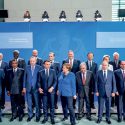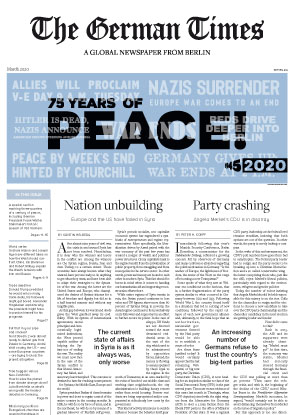Europe and the US have failed in Syria
After almost nine years of civil war, the crisis in and around Syria has not been resolved. Nonetheless, it is clear who the winners and losers in the conflict are. Among the winners are the Syrian regime, Russia, Iran and even Turkey, to a certain extent. These countries have always known what they wanted, have proven ready to do anything to get what they want, and have been able to adapt their strategies to the dynamics of the war. Among the losers are the United States and Europe, who championed the desires of Syrians citizens for a life of freedom and dignity but did so in a half-hearted manner and without any tangible plan.
As this gap between its words and deeds grew, the West gambled away its credibility. With its system of international agreements, moral principles and democratically legitimized institutions, the West proved capable neither of helping the Syrians nor of ending the war. The reality we must now face in the case of the Syrian conflict is that liberal democracy has failed, and autocracy has triumphed. This outcome is destined to have far-reaching consequences – for Syrians, the Middle East, Europe and the world.
Syrian president Bashar al-Assad remains in power and is set to regain control of the entire country in the coming months. In Idlib, he will do so by force of arms, and in the northeast, he will do so by means of a gradual takeover of Kurdish self-government. In other words, the current state of affairs in Syria is as it always was, only worse.
Assad’s reign hinges on loyalty to the regime, which he secures through a system of clientelism and enforces by means of fear. This results in his two strongest pillars of support coming from wealthy businessmen and a far-reaching intelligence apparatus. Simply put, those who support the regime are rewarded, and those who reject it are punished.
The country’s secret services are more powerful than ever. Local militias are involved in a variety of illicit activities, which include bribery, blackmail, theft and threatening or kidnapping citizens. In the years before the war, Syrians were subject to the despotism of the state alone; today, they are at the mercy of non-state and foreign actors as well.
Syria’s pseudo-socialist, neo-capitalist economic system has engendered a symbiosis of entrepreneurs and regime representatives. More specifically, the liberalization driven by Assad paired with the war economy of the past few years has created a merger of wealth and political-power structures. Crony capitalists loyal to the regime benefit from the privatization of public property, from smuggling and from monopolies in the service sector. In other words, power and money are bound to each other in modern Syria. This fact should be borne in mind when it comes to handing out humanitarian aid and supporting reconstruction efforts there.
While entire regions of Syria remain in ruin, the Syrian pound continues to lose value and UN figures show more than 80 percent of Syrians living in poverty, the Assad regime continues to focus exclusively on its followers and supporters in an effort to further secure its power. In the case of Aleppo, UN funds are not directed toward the most devastated residential areas in the east of the city, which used to be administered by opposition forces; instead, the money is flowing to areas populated by those loyal to the regime. In the south of Damascus, in an area marked by the ruins of bombed-out middle-class and working-class neighborhoods, the city administration is building luxury resorts rather than social housing. Former residents are being expropriated and/or compensated at ridiculously low costs by the government.
This kind of activity is immune to outside influence because the behavior itself guarantees the survival of Syria’s rulers. After decades of being under the regime’s thumb, society, state institutions and the private sector form a close-knit network of interdependencies. Any real concessions – such as depriving the secret services of power and ushering in freedom of expression, freedom of the press and an independent judiciary – would result in a system failure that would threaten the survival of the rulers in Damascus. By its very nature, the Syrian regime itself is incapable of instituting effective reforms.
This is an important insight for foreign actors seeking an effective approach to negotiations with Damascus. Since 2012, the US and Europe have tried to achieve a “credible political transition” in Syria that includes a transfer of power, a transitional government, a new constitution and democratic elections under UN supervision – none of which have come to pass.
The mantra repeated by heads of state and foreign ministers in the West – that is, their insistence that resolving the conflict requires a political rather than military solution – has become an embarrassing phrase. It exposes the West’s lack of strategic vision and sheer inability to act.
This mantra disregards one of the most basic rules of diplomacy: that a negotiated solution is only possible when all parties to the conflict no longer see the point in continued fighting. The situation in Syria would have to reach a stage where none of the stakeholders see any benefit to military escalation; only then would we see genuine willingness to compromise, thereby providing the diplomatic leeway needed to negotiate an agreement.
The conflict in Syria never reached such a point. For Assad, it’s always been worthwhile to fight for survival, and his regime had everything it needed to win the war in military terms: weapons of mass destruction and the readiness to use them against its own citizens; a supporting world power – in this case Russia – that wanted to keep its last ally in the Middle East in power and was therefore willing to use its air force to destroy or expel all opponents of the regime; a regional power – in this case Iran – experienced in asymmetrical warfare and capable of organizing Shi’ite militias on the ground; a war-weary world power – in this case the US – that was cautious and in retreat; divided Europeans with no plan at all; a blocked UN Security Council; and, finally, the ignorance of the world community.
Attempts by the Americans and Europeans to put pressure on Damascus were limited to a complex regime of sanctions (painful for the Syrian leadership, but tolerable thanks to the help of allied trading partners), half-hearted arms deliveries to alternating rebel groups (too few arms to win, but too many to lose) as well as two symbolic and inconsequential attacks on military bases – both in violation of international law – as a way of punishing Syria for the use of chemical weapons. None of these actions led to any change in the Syrian regime’s behavior or any increased willingness to compromise.
Against this backdrop, the idea that Europe could influence the balance of power in Syria and the realities on the ground by leveraging financial incentives for rebuilding the country is utterly naive. Any European parliamentarian – whether they represent a left-wing anti-imperialist or a right-wing nationalist party – who travels to Damascus to be shown “normal everyday life” and the “stable security situation” by regime representatives, will automatically become an unwitting propagandist for Assad. And an effective supporter of Vladimir Putin’s strategy.
In contrast to the US and Europe, the Russian president has a functioning plan in Syria. It comprises three stages: rescue, recapture and rehabilitate. Today, we are moving through the transition to phase three, the aim of which is to make the Syrian regime an accepted member of the international community once again.
The logic behind this strategy seems plausible: Assad has won and remains in power, so it makes sense to acknowledge this reality, to work constructively toward rebuilding the war-torn country, to improve conditions for its poor and to allow Syrian refugees to return.
The only problem is that anyone who wants to actually help the people of Syria would be wise not to support the Syrian regime. Indeed, every dollar and euro sent to Damascus with good intentions will only serve to further consolidate the very regime structures that led to the uprising nine years ago.
What unsuspecting politicians, journalists and bloggers perceive as stability in Syria is actually nothing more than what we would call Friedhofsruhe in German, namely that deathly calm felt in cemeteries. Assad needs the money to reward his cronies, to pacify the militias, to draw supporters closer to him through better living conditions and to maintain the secret service apparatus. He has no interest in the return of Syrian refugees from abroad; indeed, he deliberately drove most of them out of the country in the first place as a way of ridding himself off his enemies.
At the moment, Assad is delighted. After all, the UN has been working for years with government-related organizations, companies and individuals who continue to distribute aid money in a manner that suits his wishes. Some of these partners are even on US and European lists of sanctioned organizations; this is a true scandal, given that Washington and Berlin are the largest bilateral donors of humanitarian aid to Syria.
While Europeans and Americans continue to provide humanitarian aid to Syrians, thereby relieving Assad of that burden and freeing him up to pursue his Idlib campaign, Russia, Iran and Turkey are working to safeguard their long-term presence and commitment in Syria. The autocratic leaders of each of these countries simply don’t see foreign policy as a diplomatic negotiation of compromises; instead, they see it as the pursuit of a strategy of pure self-interest.
Of course, these leaders have no problem with Assad’s authoritarianism, and this means that the Syrian regime can do whatever it wants on the domestic front. Not even the Kremlin can influence Assad’s secret services. As a result, there can be no security guarantees from the Russian side for any Syrians wishing to return to their home country.
The efforts made by the three interventionist powers in the Syrian civil war have paid off. Although Ankara moved away from its original goal of regime change in Damascus, it is still able to use some of the Syrian insurgents as Islamist mercenaries to assert its own interests east of the Euphrates against the Kurds and now also in Libya. With its offensive in northeastern Syria in October 2019, Turkey drove the Democratic Union Party (PYD) into the arms of Assad and Putin, thereby preventing the creation of an autonomous Kurdish state in the medium term.
A rapprochement between Ankara and Damascus is possible; their secret service chiefs met in Moscow in January. Russia maintains three military bases in Syria and will therefore remain a presence in the East Mediterranean for decades. In addition, Russian companies succeeded in signing largely one-sided contracts for the extraction of oil, gas and phosphorus there.
Moscow is eager to strengthen state structures and contain militias in Syria – in contrast to Tehran, which is working to create a state within the state in order to secure its own military, political, economic and social influence. The recently murdered General Qassim Soleimani was in the process of setting up Syrian paramilitary groups modeled after the Iranian Revolutionary Guards and fighting for Assad under local leadership. Iran’s goal there is to repeat in Syria what it achieved with Hezbollah in Lebanon and Hashd al-Shaabi in Iraq. This would complete the Shi’ite “axis of resistance” extending from Tehran via Baghdad, Damascus and Beirut all the way to the Mediterranean and to the borders of Israel. However, this would be quite difficult in Syria, which has a Shi’ite population of only 2 percent.
The US and Europe have lost the conflict in Syria. In the short term, they should stand firm against the Syrian regime and against Russia’s attempts at “peacemaking.” They should put pressure on the UN to ensure that any humanitarian aid is given to the neediest people and not to Assad’s network of cronies. In the long term, Europeans can place their hopes on the desire of the Syrian people for change, supporting their quest for freedom, justice and reconciliation wherever they can.
Kristin Helberg
is a journalist and an expert on the conflict in Syria. She works for ARD, ORF and other broadcasters. Her book Der Syrien-Krieg: Lösung eines Weltkonflikts (The war in Syria: Solving a world conflict) was published by Herder in 2018.




